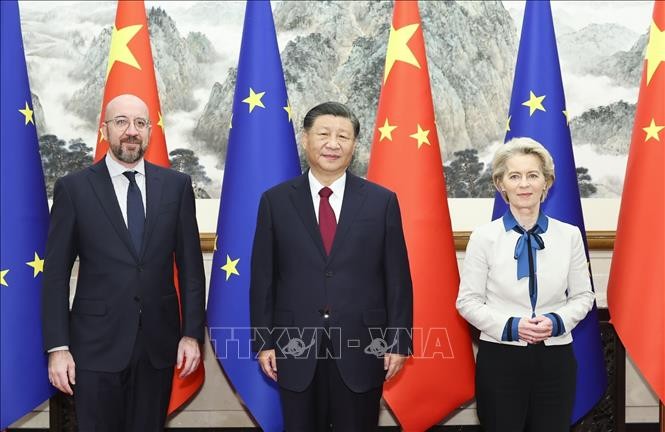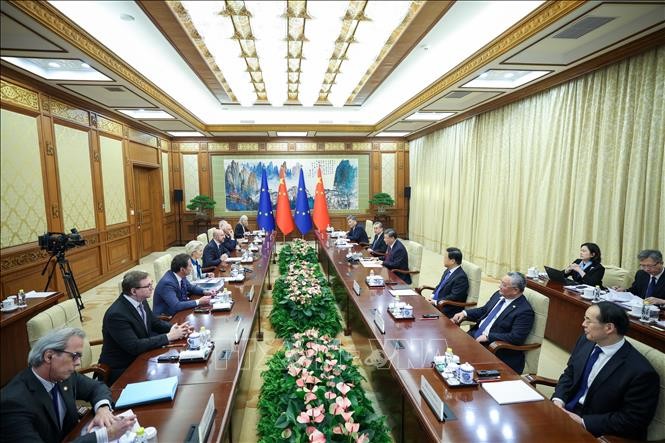(VOVWORLD) - High-ranking leaders of China and the European Union met in Beijing on Thursday to discuss pending issues in bilateral relations and establish some common perceptions, aiming to stabilize relations and promote cooperation in areas of mutual benefit.
 Chinese President Xi Jinping (C) meets President of the European Council Charles Michel (L) and President of the European Commission Ursula von der Leyen (R) in Beijing on December 7, 2023. (photo: XNA/ VNA) Chinese President Xi Jinping (C) meets President of the European Council Charles Michel (L) and President of the European Commission Ursula von der Leyen (R) in Beijing on December 7, 2023. (photo: XNA/ VNA) |
The China-EU Summit in Beijing was the 24th meeting between the two. Representing the EU at the Summit with Chinese President Xi Jinping and Premier Li Qiang were President of the European Council Charles Michel, President of the European Commission Ursula von der Leyen, and High Representative for Foreign Affairs and Security Policy Josep Borrell. This was the first face-to-face meeting in 4 years between the top leaders of China and the EU, following the COVID-19 pandemic and ongoing problems in bilateral relations.
Balancing trade relations
Trade was the top priority topic at the Summit. President of the European Commission Ursula von der Leyen said China is the EU's most important trading partner. Bilateral trade exceeds 2.1 billion USD per day, but the EU's trade deficit with China in the past 2 years has been high.
Data released at the Summit by China Customs showed that, in the first 11 months of this year, China exported more than 458 billion USD worth of goods to the EU and imported more than 257 billion USD worth. Von der Leyen said things must change and, first of all, there must be a frank discussion of current disagreements.
“There are clear imbalances and differences that we must address”, said Von der Leyen, and they need to responsibly manage the concerns that they have.
In order to balance bilateral trade, senior EU officials want China to further open its domestic market to European products like medical equipment, alcoholic beverages, children's nutritional milk, and cosmetics.
Premier Li Qiang said China does not create barriers against European companies and both sides need to objectively look into the causes of bilateral trade imbalance, which include China’s declining demand due to economic complications and growth in labor productivity.
He said the EU should act cautiously to avoid politicization of commercial issues.
The EU and Chinese leaders discussed frankly their different economic strategies – China’s dual circulation strategy and the EU’s strategy of minimizing risks to the supply chain. Von der Leyen said that the two sides have similar strategic calculations and clear dialogue will reduce the risk of economic "decoupling", a scenario that the EU does not want.
 The 24th China-EU Summit in Beijing on December 7, 2023. (photo: XNA/VNA) The 24th China-EU Summit in Beijing on December 7, 2023. (photo: XNA/VNA) |
Stabilizing relations for mutual interests
When a frank discussion of economic relations produced no breakthrough, the leaders tried to achieve some result in other areas of shared interest.
Both sides agreed to enhance cooperation in monitoring regulations and restrictions related to cross-border data transfers, thereby helping European companies operate more smoothly in the Chinese market. They reaffirmed their commitment to working together to respond to global challenges like climate change, artificial intelligence, and armed conflicts.
President Xi said China and the EU are forces for multilateralism and cultural diversity, so they need to handle their bilateral relations appropriately to benefit all parties.
“We need to have the right perspective on a comprehensive strategic partnership. China and the EU should be mutually beneficial cooperation partners, constantly promote political trust, build strategic consensus, consolidate relations, strengthen dialogue and cooperation for the benefit of their people, and jointly respond to global challenges," said Xi.
President of the European Council Charles Michel said that, despite many differences, China and the EU shoulder great responsibility for the world and share an interest in maintaining global peace and stability and reforming global governance.
“We have made progress in areas of shared interest and we will continue to engage with China based on transparency, predictability, and reciprocity. Now it's time to speed up this progress and to make our relationship fairer and more reciprocal, and to work together to tackle some of the world's most pressing challenges," Charles Michel said.
Observers say that, although no specific commitments or agreements were made, the China-EU Summit achieved some positive results. Noah Barkin, an expert with the German Marshall Fund, said the Summit was successful because both sides responsibly managed their differences, prevented any downward trend in relations, and tried to understand each other’s concerns in order to seek solutions together.